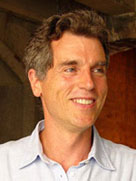
Man with a Plan
Thomas Homer Dixon would approve of grid tie solar systems. These are sets of solar panels, batteries and inverters which power a house but also export their surplus energy onto the grid.
Homer-Dixon’s big idea is resilience the need for society to improve its capacity to withstand shocks like power cuts, food shortages and terrorist attacks. He has just published a monumental book on the subject called The Upside of Down, the fruits of 5 years research.
It sketches out the main threats facing us today, and the actions we all need to take to avert collapse of civilisation.
(The “Upside” of the title is that there are things we can do to make the collapse more tolerable, when it comes) But Homer-Dixon is not a survivalist. He is not even into the idea of living 100% off-grid. Director of the Trudeau Centre for Peace and Conflict Studies in Toronto, he is an authority on what he calls social adaptation to complex stress. With his academic hat on he says the probability of complete breakdown of civilisation over the next 50 years is a relatively high 50%. Speaking as a human being and a father of a 20 month old son he told me I wouldn’t be surprised if we see something really bad in the next twenty years.
Homer-Dixon believes there is a substantial possibility of multiple catastrophes occurring simultaneously with consequences adding up to more than the sum of their parts. He calls this synchronous failure, and considers it, rather than any of the individual things that might go wrong, to be the real danger of the 21st century.
It is because the world is so highly connected that a collapse in one part of the system could cascade through to the rest of the world. That is one reason why off-grid living makes sense as a defence mechanism. It is a loosening of the ties that bind us all so tightly together. A combination of off-grid and grid-tied solar systems would make the world a more resilient place.
Homer-Dixon wants to see more off-grid homes meaning those without mains power and water. He thinks the more varied the way we live, the better chance we will survive catastrophe. You don’t want to eliminate connectivity entirely because damaged parts can draw on undamaged parts, he said. But we are way too far towards the high connectivity part of the spectrum. Homer-Dixon also wants to see many more grid-tied solar and wind systems in operation. In the event of power blackout, they could then feed into the system helping it heal itself. Human ingenuity will be what saves us as long as we prepare resilient systems to survive.
We are hoping to move in that direction in our own household, he told me last week.But even if we end up generating 80-100% of our energy from solar and maybe some wood, I am not going to disconnect the electricity and natural gas because they are very useful as a fallback in an emergency, or if for some reason my battery fails or the bearing in my windmill fails. Renewable energy improves the resilience in his domestic, personal life its about fallback in the case of failure.
Homer-Dixon is enough of a realist to know that some of the arguments come down to money. The big problem is that there are a lot of capital requirements at the front end. He plans to spend the next ten years publicly advocating the reforms he believes necessary, in a very hard headed practical way.. The upfront costs have to be discussed at a societal level. I have begun discussions with businessmen here for the upfront costs to be held by a company which benefits from the carbon credits or from repayments of the capital cost.
Environment, Scarcity, and Violence by Homer-Dixon – buy it from Amazon
Government have a great responsibility to act Policymakers need to bring resilience into the core of their discourse, he told me./ that might be reduce the risk of cascading failure in global financial systems. He wants to see the Tobin tax introduced urgently in his home country of Canada and elsewhere. These are taxes on cross-border currency transactions, and will help tame currency market volatility and restore national economic sovereignty. The revenue would go to global priorities: basic environmental and human needs.
But for now Homer-Dixon’s ideas are outside the top table of power. When was it ever discussed at something like Davos, he asked me. These ideas are not even part of the language once they are there are countless things that can be done financial incentives to decentralize food and energy, for example. But I wouldn’t go as far as saying that everyone needs to go off-grid.
The most adaptive systems are connected at least a certain amount, concludes Homer-Dixon. because they need to be able to learn from each other, but they can’t if they are completely disconnected in moments of crisis they need to draw on each other.
The new book has its own web site at www.theupsideofdown.com
powkey Portable Power Station 350W, 260Wh/70,000mAh Backup Lithium Battery, 110V Pure Sine Wave Power Bank with 2 AC Outlets, Portable Generator for Outdoors Camping Travel Hunting Emergency
Now retrieving the rating.
$192.98 (as of April 24, 2024 13:58 GMT +01:00 - More infoProduct prices and availability are accurate as of the date/time indicated and are subject to change. Any price and availability information displayed on [relevant Amazon Site(s), as applicable] at the time of purchase will apply to the purchase of this product.)Amazon Visa
Now retrieving the rating.
$23.00 (as of April 24, 2024 13:58 GMT +01:00 - More infoProduct prices and availability are accurate as of the date/time indicated and are subject to change. Any price and availability information displayed on [relevant Amazon Site(s), as applicable] at the time of purchase will apply to the purchase of this product.)200W Portable Power Station, Powkey 120Wh/33,000mAh Power Bank with AC Outlet, 110V 6 Outputs Solar Generator External Battery Pack with LED Light for Home Use and Outdoor Camping
Now retrieving the rating.
31% OffAnker Power Bank Power Station 60,000mAh,Portable Outdoor Generator 87W with Smart Digital Display, Retractable Auto Lighting and SOS Mode, Home Backup(PowerCore Reserve 192Wh) for Travel, Camping
Now retrieving the rating.
$149.99 (as of April 24, 2024 13:58 GMT +01:00 - More infoProduct prices and availability are accurate as of the date/time indicated and are subject to change. Any price and availability information displayed on [relevant Amazon Site(s), as applicable] at the time of purchase will apply to the purchase of this product.)Foldable Solar Panel Charger 60W with 18V DC Output (11 Connectors) for 100W~350W Portable Power Stations Jackery/Rockpals/Flashfish/Enginstar, Portable Solar Generator for Outdoor Camping Van RV Trip
Now retrieving the rating.
$98.99 (as of April 24, 2024 13:58 GMT +01:00 - More infoProduct prices and availability are accurate as of the date/time indicated and are subject to change. Any price and availability information displayed on [relevant Amazon Site(s), as applicable] at the time of purchase will apply to the purchase of this product.)





One Response
Having read several leading experts on climate change and the post-industrial age, smart grids, and using more solar photovoltaic cells are but two alternatives to our current need for hydrocarbon energy.